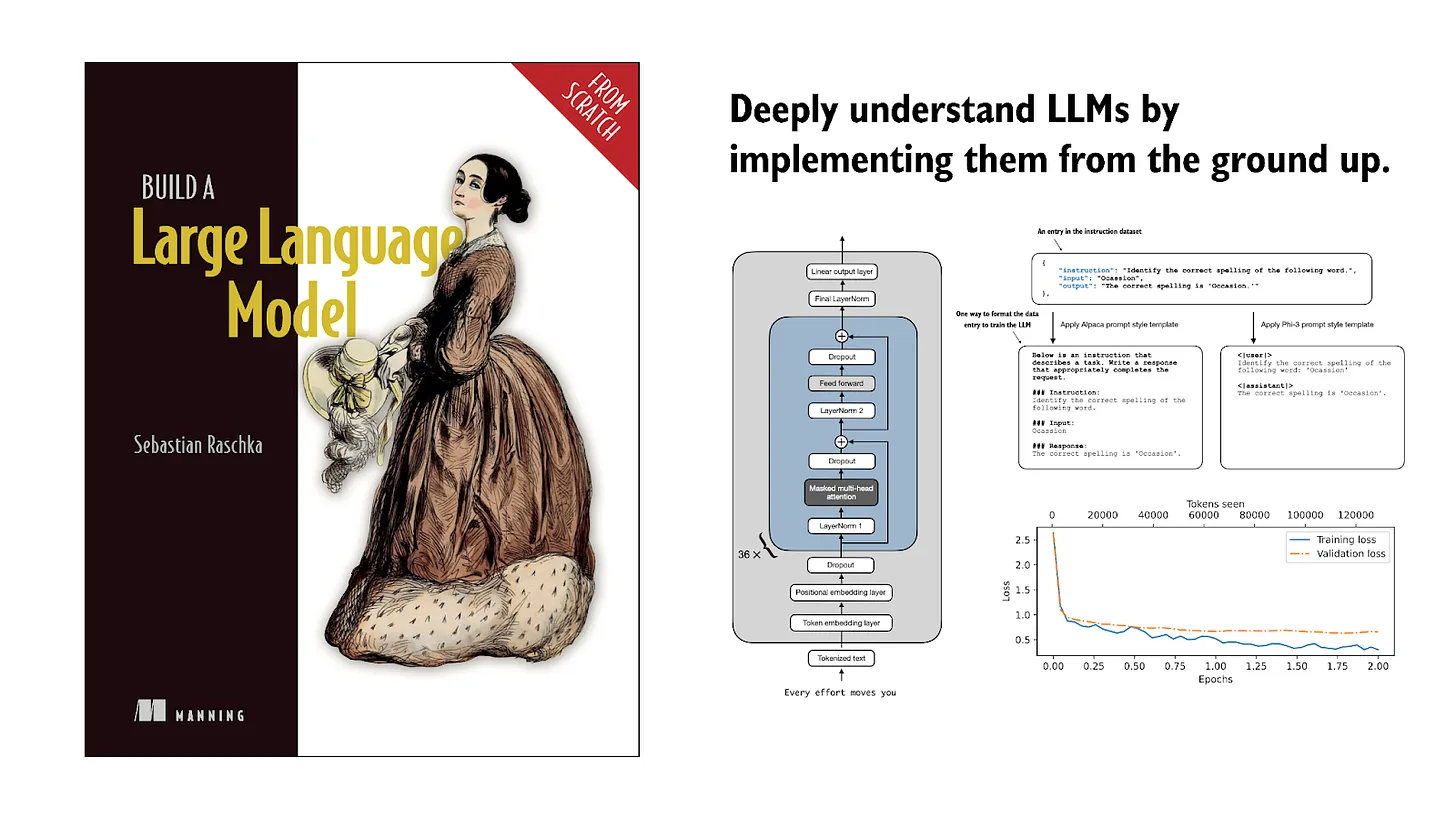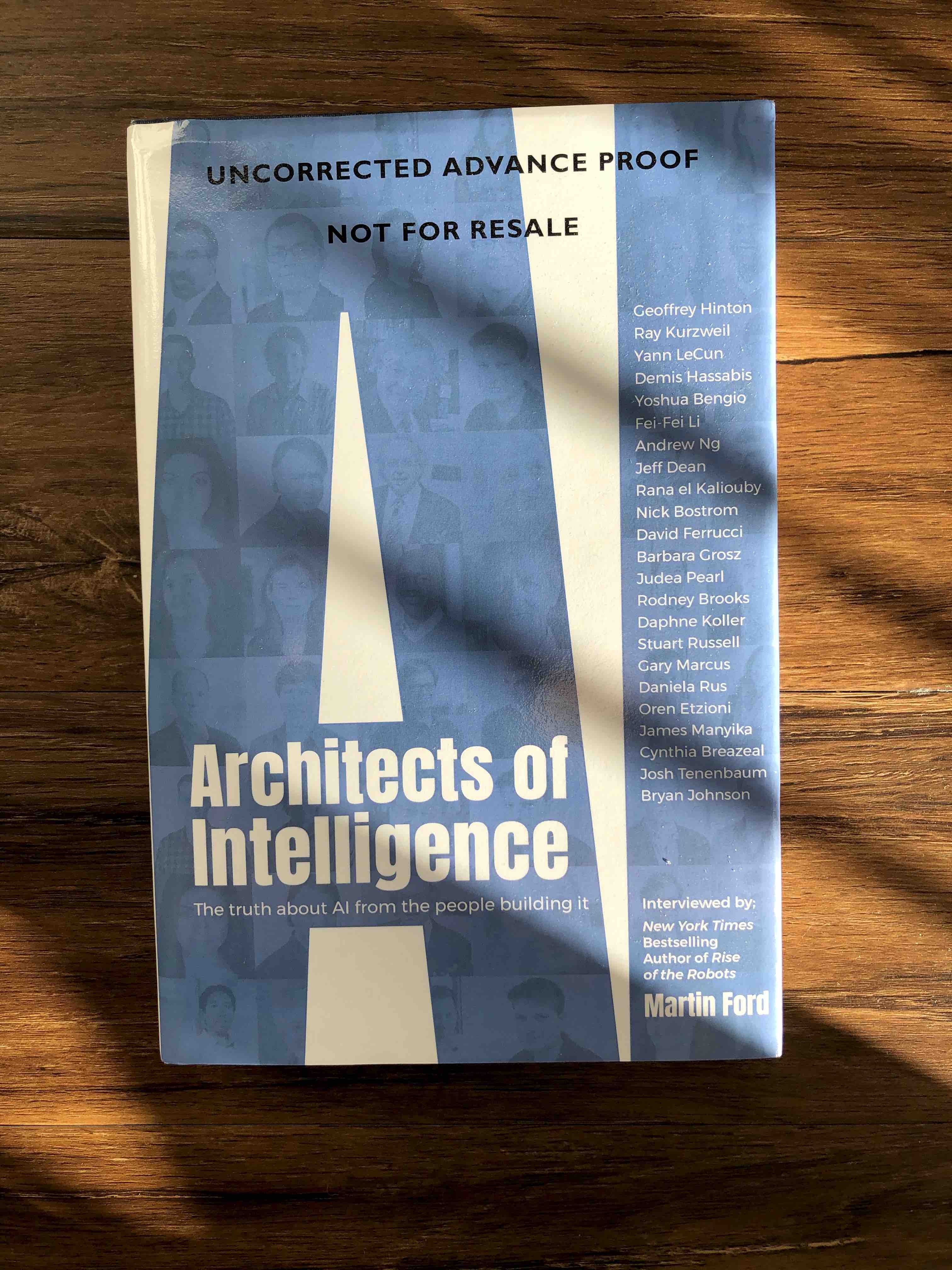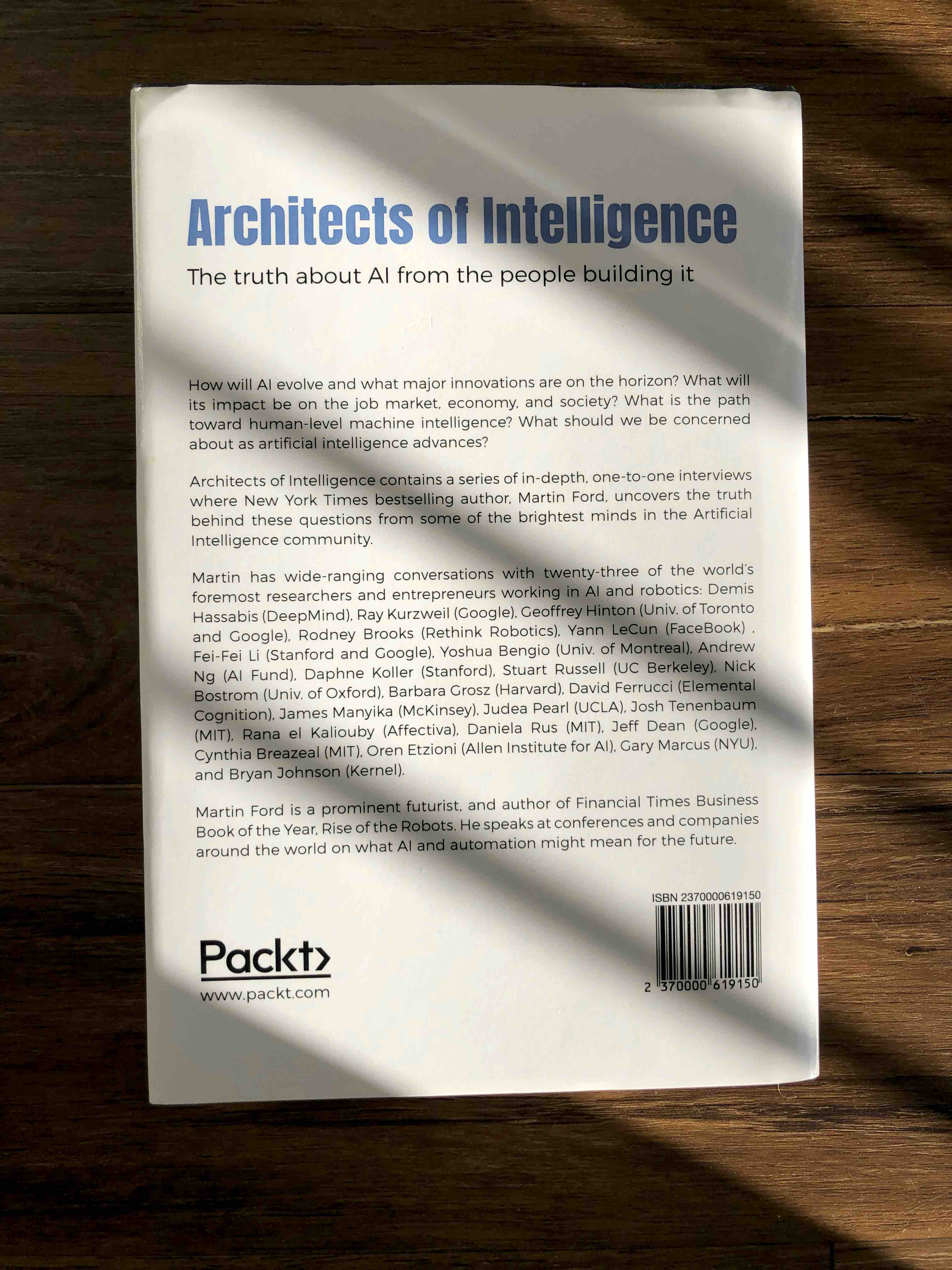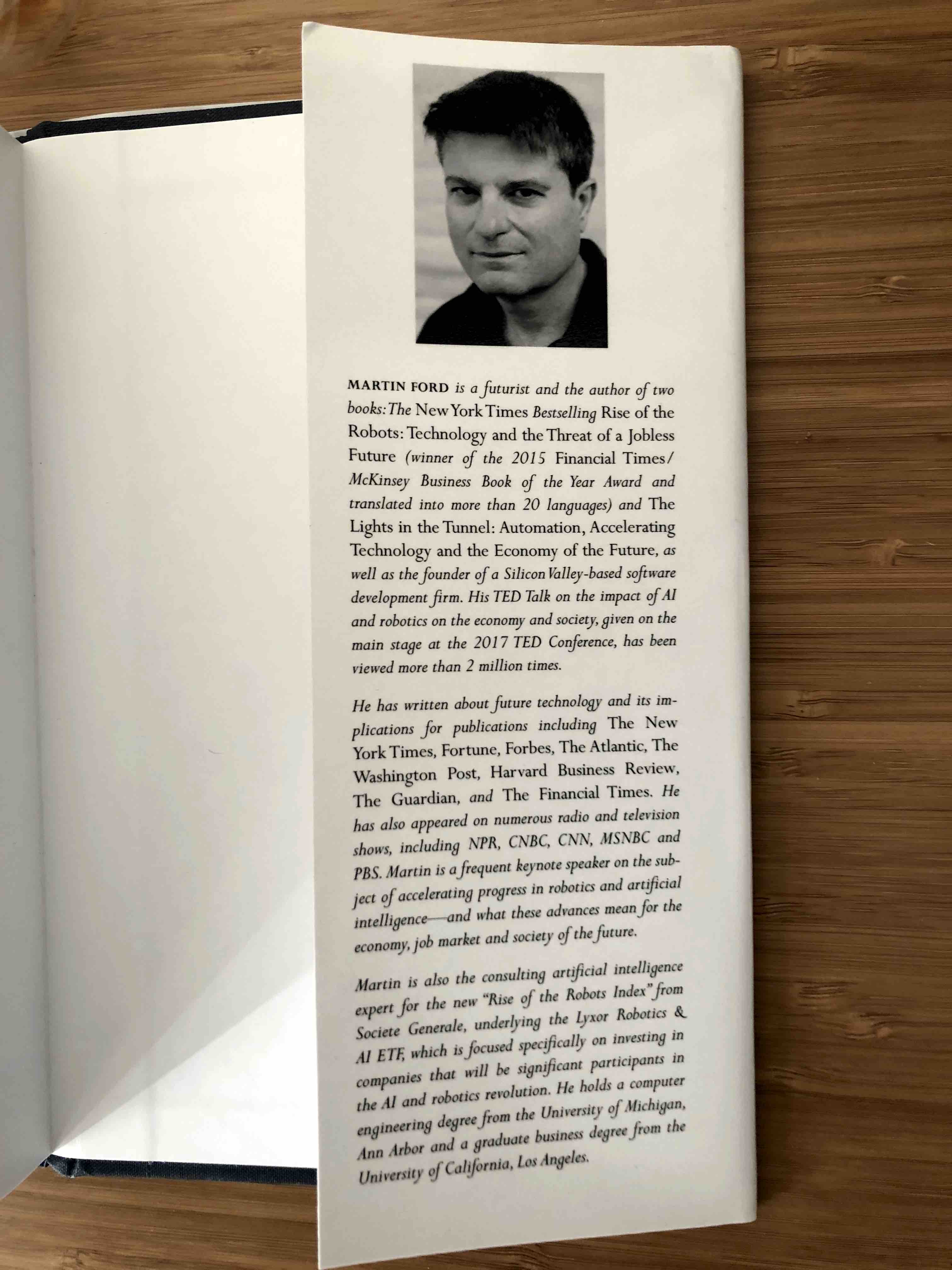Book Review: Architects of Intelligence by Martin Ford
As a consequence of my New Year’s resolution – ~1 hour of non-fiction reading each morning, instead of checking my emails and social media – I just finished the first book in 2020 and want to share a brief review.
“I’m thrilled that AI is actually out there in the world making a difference because I didn’t think that it would happen in my lifetime – because it seemd the problems were so hard.” – Barbara J. Grosz (Higgins Professor of Natural Sciences, Harvard University)
Disclaimer: I received a free copy from the publisher around Christmas 2018 (i.e., more than a year ago). However, the free copy did not come with the promise to share my opinion or write a review. My other New Year’s resolution is to get back to blogging, and I am planning to share short reviews of some of the non-fiction books I am planning to read in 2020.
Overview
“Architects of Intelligence – The truth about AI from the people building it” by Martin Ford is an interview book featuring 23 of the most well-known researchers and brightest minds who are working on deep learning, artificial intelligence, and (or) robotics.
What I found particularly refreshing was that it was a good mix of people from academia and industry. Namely,
- Demis Hassabis (Google DeepMind)
- Yoshua Bengio (Professor of Computer Science at University of Montreal)
- Stuart J. Russell (Professor of Computer Science at UC Berkeley)
- Ray Kurzweil (Director of Engineering at Google)
- Geoffrey Hinton (Emeritus Prof. of C.S. at U. of Toronto); Engineering Fellow at Google)
- Nick Bostrom (Prof. of Philosophy at U. of Oxford; Director of the Future of Humanity Institute)
- Yann LeCun (Prof. of Computer Science at NYU; Chief AI Scientist at Facebook)
- Fei-Fei Li (Prof. of Computer Science at Stanford; Chief Scientist at Google Cloud)
- Demis Hassabis (Founder and CEO of Google DeepMind)
- Andrew Ng (Adjunct Prof. of C.S. at Stanford; CEO of Landing AI)
- Rana El Kaliouby (Founder and CEO of Affectiva)
- Ray Kurzweil (Director of Engineering at Google)
- Daniela Rus (Director of MIT CSAIL)
- James Manyika (Chairman and Director of McKinsey Global Institute)
- Gary Marcus (Professor of Psychology and Neuroscience at NYU)
- Barbara J. Grosz (Professor of Natural Sciences at Harvard)
- Juda Pearl (Professor of Computer Science and Statistics at UCLA)
- Jeffrey Dean (Head of AI at Google and lead of Google Brain)
- Daphne Koller (Founder and CEO of Insitro; Adj. Prof. of C.S. at Stanford)
- David Ferrucci (Founder of Elemental Cognition; Director of Applied AI at Bridgewater)
- Rodney Brooks (Chairman of Rethink Robotics)
- Cynthia Breazeal (Director of the Personal Robots Group at MIT Media Lab)
- Joshua Tenenbaum (Prof. of Computational Cognitive Science at MIT)
- Oren Etzioni (CEO of the Allen Institute for Artificial Intelligence)
- Bryan Johnson (Founder of Kernel and OS Fund)
The book has about 500 pages in total, so the average interview length is 20 pages.
Who is Martin Ford?
Martin Ford is the author of two other bestselling books, “the Rise of the Robots: Technology and the Threat of a Jobless Future” and “The Lights in the Tunnel: Automation, Accelerating Technology and the Economy of the Future.” Furthermore, Martin Ford is a so-called “futurist,” and according to his website, he is a “founder of Silicon Valley-based software development firm.” Embarrassingly, I have to admit that I hadn’t heard about Martin Ford before and was a bit skeptical when I read “futurist.” However, Martin Ford came across as very knowledgeable in the fields of machine learning, deep learning, and artificial intelligence, and his insightful questions showed that he was very well prepared. I think that Martin Ford is a great interviewer, and I really enjoyed the conversations.
The different backgrounds, affiliations, and areas of expertise kept the interviews very interesting and diverse. However, the conversations also followed a general structure consisting of three main parts: the interviewee’s background, questions about the interviewee’s area expertise, and closing questions along the lines of
- “When will human-level AI be achieved?”
- “What about the concern that a superintelligent system might someday break free of our control and pose a genuine threat to humanity?”
In case anyone wonders about my personal views. Regarding (1), regarding the “if” (versus “when”) scenario: I think that human-level AI may be achieved someday. I think it’s impossible to have confidence in predicting when it will happen, because it is hard to predict something that doesn’t exist, yet. To me, asking someone when human-level AI will be achieved is similar to asking a person in the 18th century, after the discovery of electricity, when the first microprocessor for a computer will be created.
I find worrying about (2) a bit silly, and right now, I don’t worry about AGI turning evil. Instead, I think we should rather worry about people who are abusing current DL-based technology in the context of violating people’s privacy and generating deepfakes and fake news.
My favorite interviews
It’s hard to pick favorites. However, if I had to choose, I remember that Rodney Brooks’s and Cynthia Breazeal’s interviews really stood out, possibly because robotics is not my area of expertise. These interviews had the highest “new information” content for me.
As founder of iRobot (who created the Roomba vacuum cleaners among others), I found Rodney Brooks’s insights into the history of robotics, the current state of the art, and the outlook fascinating, and his down-to-earth perspective was really refreshing. In a similar vein, I was very interested to hear about human-robot interactions and “social robots” Cynthia Breazeal.
“We don’t have anything anywhere near as good as an insect, so I’m not afraid of superintelligence showing up anytime soon.” – Rodney Brooks (Found of iRobot and Chairman of Rethink Robotics)
Verdict and recommendation
In short, I really liked this book, although I wouldn’t go so far and include it in my personal top 10 list. While I usually prefer an audio format (i.e., podcasts) when it comes to interviews, I think that if you like Lex Fridman’s Artificial Intelligence Podcast, you will have a good time with this book.

If you read the book and have a few minutes to spare, I'd really appreciate a brief review. It helps us authors a lot!
Your support means a great deal! Thank you!

